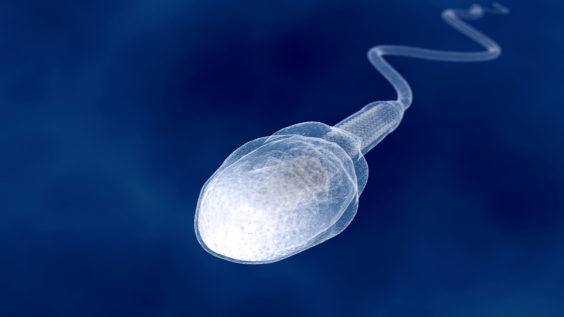Low sperm count means that the fluid (semen) you ejaculate during an orgasm contains fewer sperm than normal. A low sperm count is also called oligospermia (ol-ih-go-SPUR-me-uh). A complete absence of sperm is called azoospermia. Your sperm count is considered lower than normal if you have fewer than 15 million sperm per milliliter of semen.
Having a low sperm count decreases the odds that one of your sperm will fertilize your partner’s egg, resulting in pregnancy. Nonetheless, many men who have a low sperm count are still able to father a child.
The main sign of low sperm count is the inability to conceive a child. There may be no other obvious signs or symptoms. In some cases, an underlying problem such as an inherited hormonal imbalance, dilated testicular veins or a condition that blocks the passage of sperm may cause signs and symptoms. Low sperm count symptoms may include:
Problems with sexual function — for example, low sex drive or difficulty maintaining an erection (erectile dysfunction)
Pain, swelling or a lump in the testicle area
Decreased facial or body hair or other signs of a chromosome or hormone abnormality
When to see a doctor
See a doctor if you:
- Are unable to conceive a child after a year of regular, unprotected sexual intercourse with your partner
- Have erection or ejaculation problems, low sex drive or other problems with sexual function
- Have pain, discomfort, a lump or swelling in the testicular area
- Have a history of testicle, prostate or sexual problems
- Have had groin, testicle, penis or scrotum surgery
The production of sperm is a complex process and requires normal functioning of the testicles (testes) as well as the hypothalamus and pituitary glands — organs in your brain that produce hormones that trigger sperm production. Once sperm are produced in the testicles, delicate tubes transport them until they mix with semen and are ejaculated out of the penis. Problems with any of these systems can affect sperm production. Also, there may be problems of abnormal sperm shape (morphology), movement (motility) or function. Often the cause of low sperm count isn’t ever identified.
Medical causes
Low sperm count can be caused by a number of health issues and medical treatments. Some of these include:
Varicocele. A varicocele (VAR-ih-koe-seel) is a swelling of the veins that drain the testicle. It’s a common cause of male infertility. This may prevent normal cooling of the testicle, leading to reduced sperm count and fewer moving sperm. The treatment of a varicocele often improves sperm quality and overall fertility.
Infection. Some infections can interfere with sperm production and sperm health or can cause scarring that blocks the passage of sperm. These include some sexually transmitted infections, such as chlamydia and gonorrhea; inflammation of the prostate (prostatitis); inflamed testicles; and other infections of the urinary tract or reproductive organs.
Ejaculation problems. Retrograde ejaculation occurs when semen enters the bladder during orgasm instead of emerging out of the tip of the penis. Various health conditions can cause retrograde ejaculation, including diabetes, spinal injuries, and surgery of the bladder, prostate or urethra. Certain medications also may result in retrograde ejaculation, such as blood pressure medications known as alpha blockers. Some men with spinal cord injuries or certain diseases can’t ejaculate semen at all, though they still can produce sperm.
Antibodies that attack sperm. Anti-sperm antibodies are immune system cells that mistakenly identify sperm as harmful invaders and attempt to destroy them.
Tumors. Cancers and nonmalignant tumors can affect the male reproductive organs directly, or can affect the glands that release hormones related to reproduction (such as the pituitary gland). Surgery, radiation or chemotherapy to treat tumors can also affect male fertility.
Undescended testicles. During fetal development one or both testicles sometimes fail to descend from the abdomen into the sac that normally contains the testicles (scrotum). Decreased fertility is more likely in men with this condition.
Hormone imbalances. The hypothalamus, pituitary and testicles produce hormones that are necessary to create sperm. Alterations in these hormones, as well as from other systems such as the thyroid and adrenal, may impair sperm production.
Sperm duct defects. The tubes that carry sperm can be damaged by illness or injury. Some men are born with a blockage in the part of the testicle that stores sperm (epididymis) or a blockage of one of the tubes that carry sperm out of the testicles (vas deferens). Men with cystic fibrosis and some other inherited conditions may be born without sperm ducts altogether.
Chromosome defects. Inherited disorders such as Klinefelter’s syndrome — in which a male is born with two X chromosomes and one Y chromosome instead of one X and one Y — cause abnormal development of the male reproductive organs. Other genetic syndromes associated with infertility include cystic fibrosis, Kallmann’s syndrome and Kartagener syndrome.
Celiac disease. A digestive disorder caused by sensitivity to gluten, celiac disease can cause male infertility. Fertility may improve after adopting a gluten-free diet.
Certain medications. Testosterone replacement therapy, long-term anabolic steroid use, cancer medications (chemotherapy), certain antifungal and antibiotic medications, some ulcer medications and some other medications can impair sperm production and decrease male fertility.
Environmental causes
Overexposure to certain environmental elements can affect sperm production or function. Specific causes include:
Industrial chemicals. Extended exposure to benzenes, toluene, xylene, herbicides, pesticides, organic solvents, painting materials and lead may contribute to low sperm counts.
Heavy metal exposure. Exposure to lead or other heavy metals also may cause infertility.
Radiation or X-rays. Exposure to radiation can reduce sperm production. It can take several years for sperm production to return to normal. With high doses of radiation, sperm production can be permanently reduced.
Overheating the testicles. Frequent use of saunas or hot tubs may temporarily lower your sperm count. Sitting for long periods, wearing tight clothing or using a laptop on your lap for long periods of time also may increase the temperature in your scrotum and reduce sperm production. The type of underwear you choose to wear is unlikely to significantly impact your sperm count.
Prolonged bicycling. Prolonged bicycling is another possible cause of reduced fertility due to overheating the testicles.
A number of risk factors are linked to low sperm count and other problems that can cause low sperm count.
They include:
- Smoking tobacco
- Drinking alcohol
- Using certain illegal drugs
- Being overweight
- Having certain past or present infections
- Being exposed to toxins
- Overheating the testicles
- Having a prior vasectomy or vasectomy reversal
- Being born with a fertility disorder or having a blood relative with a fertility disorder
- Having certain medical conditions, including tumors and chronic illnesses
- Undergoing cancer treatments, such as surgery or radiation
- Taking certain medications
- Performing prolonged activities such as bicycling or horseback riding, especially on a hard seat or poorly adjusted bicycle.
Infertility caused by low sperm count can be stressful for both you and your partner.
Complications can include:
- Surgery or other treatments for an underlying cause of low sperm count
- Expensive and involved assisted reproductive techniques, such as in vitro fertilization
- Stress related to the inability to have a child
The best form of treatment in most low sperm count cases is using herbal medicinal methods and system and that at KJnature.com, we have taken and set as priority with medically tested and proven results.






Leave a Reply
You must be logged in to post a comment.